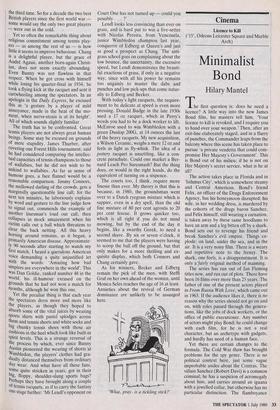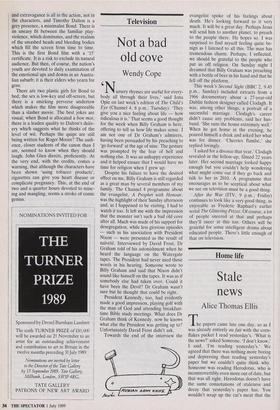Cinema
Licence to Kill (`15', Odeons Leicester Square and Marble Arch)
Minimalist Bond
Hilary Mantel
he first question is: does he need a licence? A little way into the new James Bond film, his masters tell him, 'Your licence to kill is revoked, and I require you to hand over your weapon.' Then, after an exit-line elaborately staged, and in a flurry of punches, the Commander leaps from the balcony where this scene has taken place to pursue 'a private vendetta that could com- promise Her Majesty's Government'. This is Bond out of his milieu; if he is not on Her Majesty's secret service, what is he at all?
The action takes place in Florida and in `Isthmus City', which is somewhere steamy and Central American. Bond's friend Felix, an officer of the Drugs Enforcement Agency, has his honeymoon disrupted; his wife, in her wedding dress, is murdered by the cohorts of the drugs baron Sanchez, and Felix himself, still wearing a carnation, is taken away by these same hoodlums to have an arm and a leg bitten off by a shark. Bond sets out to revenge his friend and break Sanchez's evil empire. Things ex- plode: on land, under the sea, and in the air. It is a very noisy film. There is a weary and repetitive note to the frenzy. The shark, one feels, is a disappointment. It is only a fairly original method of maiming.
The series has run out of Ian Fleming titles now, and run out of plots. There have been 16 films over more than 25 years. The father of one of the present actors played in From Russia With Love, which came out in 1963. If the audience likes it, there is no reason why the series should not go on and on, with roles passed through the genera- tions, like the jobs of dock workers, or the office of public executioner. Any number of actors might play Bond; he could change with each film, for he is not a real character, but an archetype with gadgets, and hardly has need of a human face.
Yet there are certain changes to the formula. The Cold War thaw has brought problems for the spy genre. There is no political context here, just some vague improbable asides about the Contras. The villain Sanchez (Robert Davi) is a common criminal; he has a suspicion of acromegaly about him, and carries around an iguana with a jewelled collar, but otherwise has no particular distinction. The flamboyance and extravagance is all in the action, not in the characters, and Timothy Dalton is a grey presence, a minimalist Bond. There is an uneasy fit between the familiar play- violence, which dominates, and the realism of the smashed heads and bleeding bodies which fill the screen from time to time. This is the first Bond film with a '15' certificate. It is a risk to exclude its natural audience. But then, of course, the nation's youth are devoted to daily examination of the emotional ups and downs in an Austra- lian suburb; it is their elders who yearn for gore.
There are two plastic girls for Bond to bed; the sex is low-key and off-screen, but there is a smirking perverse undertow which makes the film more disagreeable than a slasher movie. The best jokes are visual; when Bond is allocated a bon mot, there is a leaden quality to Dalton's deliv- ery which suggests what he thinks of the level of wit. Perhaps the quips are still ' being written for Roger Moore? The audi- ence, closer students of the canon than I am, seemed to know when they should laugh. John Glen directs, proficiently. At the very end, with the credits, comes a warning, that although the characters have been shown 'using tobacco products', cigarettes can give you heart disease or complicate pregnancy. This, at the end of two and a quarter hours devoted to minc- ing and mangling, seems a stroke of comic genius.











































 Previous page
Previous page